NCDC Management is headed by the Director, who is assisted by Deputy Directors.
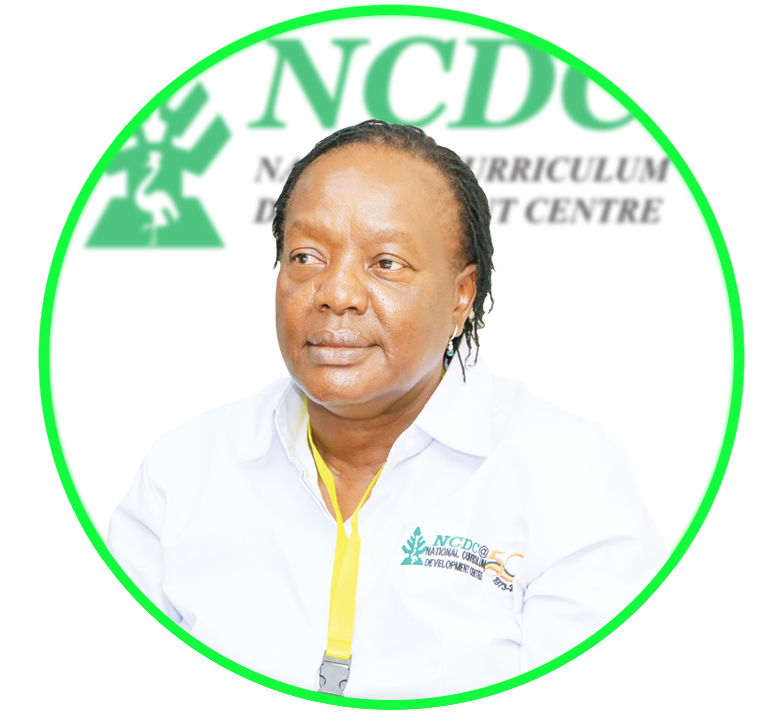 DirectorDr. Grace K. Baguma
DirectorDr. Grace K. Baguma Dr. Richard IrumbaDeputy Director Research, Consultancy
Dr. Richard IrumbaDeputy Director Research, Consultancy
& Library Services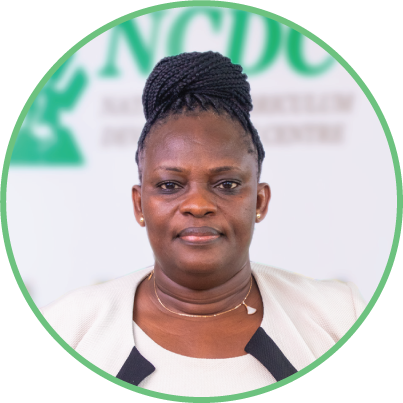 Dr. Bernadette N. KaruhangaDeputy Director Curriculum, Review
Dr. Bernadette N. KaruhangaDeputy Director Curriculum, Review
& Instructional Materials Development
Functions
Plans, directs, oversees and coordinates the Human Resource and Administrative function at the Centre.
Coordinates the designing and implementation of effective regular reviews of Human Resource policies, procedures and programmes for harmonious working relationships.
Develops and coordinates employee induction and on the job- orientation courses aimed at providing employees with relevant information about their work and the Centre.
Conducts training needs assessments and prepares staff Training and Development programmes under the guidance of the Human Resource Manager.
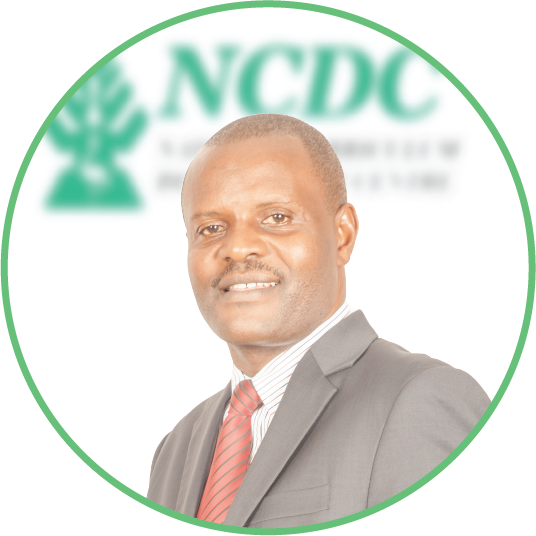
Manager HR and Admin
Functions of Finance Department
- Obtaining and handling any monies on behalf of the
NCDC. - The department controls the income and expenditure in
addition to ensuring effective business running with
minimum disruptions. - Handles the payroll, income and expenses.
- Conducts cost-benefit analysis to improve key business
strategies. - Keeps and manages all account records of NCDC.
- Reconciles NCDC’s financial registers to make suitable
business decisions. - Bookkeeping and income statement preparations.
- Manages statutory deductions from employees.
- Filing requisite financial data to the auditors and Ministry
of Finance. - Plans and implements the NCDC's financial year budget.
- conducts research and collects data to use in temporary and permanent financial forecasts.
- Plans for acquiring, updating and maintaining the latest
operations systems to improve efficiency.

Manager, Finance
Functions of PDU
- Manage and coordinate all procurement and disposal activities of the Ministry.
- Act as a secretariat and support the functionality of the contracts committeee.
- Act as representative and liaison of the PPDA.
- Support the functioning and implement the decisions of the Procurement Authority.
- Prepare tendering documents and advertise the tender opportunities
- Providing technical guidance to the Missions on procurement and disposal matters

Head, Procurement & Disposal Unit
Functions of Internal Audit
- Verify the existence of assets and recommend proper safeguards for their protection;
- Evaluate the adequacy of the system of internal controls;
- Recommend improvements in controls;
- Assess compliance with policies and procedures and sound business practices;
- Assess compliance with laws and contractual obligations.
- Review operations/programs to ascertain whether results are consistent with established objectives and whether the operations/programs are being carried out as planned;
- Investigate reported occurrences mismanagement of resources.
- Act as consultancy Unit of the Centre, etc.
Reporting structure of the Internal Audit function
The Internal Audit function has two reporting lines: to the Governing Council through the Audit and Risk Assurance Committee; administratively and to the Director/Accounting Officer.
However, in accordance with the Public Finance Management Act (PFMA), 2015 (as amended), Internal Audit functionally also reports to the Sector Audit Committee and the Internal Auditor General (IAG).
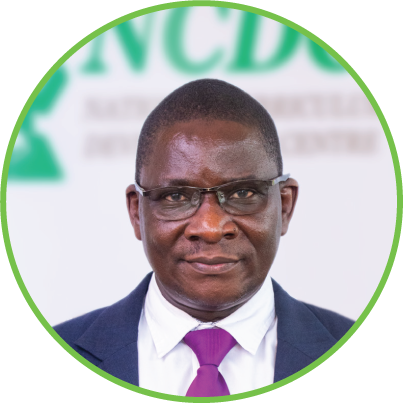
Chief Internal Auditor
Purpose
To design and guide institutional strategic and capital investment planning; budget and mobilise resources for the implementation of interventions; as well as monitor, evaluate and advice on the achievement of results.
Main Duties and Responsibilities
- Oversee development/review and effective implementation of the strategic plan, functions and mandate of the Centre.
- Spearhead the implementation of the institutional M&E Framework and Plans, monitoring exercises and methodologies of baseline, mid-term, end-term and ex-post evaluations, coordinate reporting and dissemination.
- Secretariat to the Centre’s Budget Committee and advise management on matters of planning, budgeting, capital investments, M&E and compliance to national economic development guidelines
- Oversee the design and implementation of capital investment projects.
- Spearhead and coordinate institutional resource mobilisation initiatives.
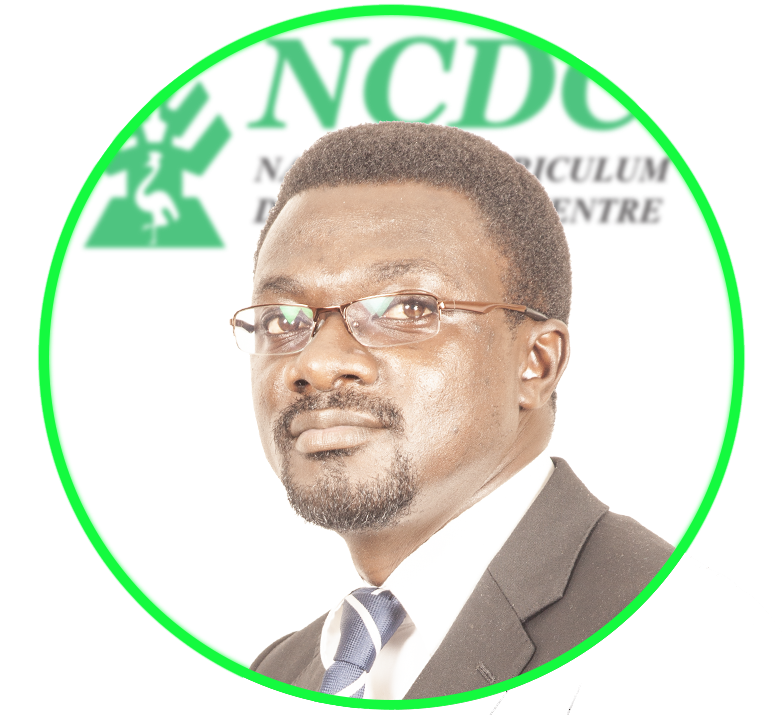
Head, Planning Unit (Senior Economist)
Early Childhood Care & Education
Early childhood care and education describes the period of learning that takes place from birth to 8 years old. Early Childhood Education is a term that refers to educational programs and strategies geared toward children from birth to the age of eight. Early childhood education often focuses on guiding children to learn through play.
The Aims and Objectives of Early Childhood Care and Education
According to the “Education for National Integration and Development”, (Government White Paper on The Education Policy Review Commission Report – 1992), the aims and Objectives of pre-primary education are under listed:
- To develop capabilities and healthy physical growth of the child through play/ activities.
- To help the child develop good social habits as an individual and as a member of society.
- To develop moral values in the child.
- To receive work from the academic departments and evaluate make recommendations on how to improve it.
- To enrich the child’s experience by developing imagination, self-reliance and thinking power.
- To help the child towards appreciating his/her national cultural background and customs, and developing a feeling of love and care for other people and for Uganda and a sense of unity leading to a national stance.
- To develop language and communication skills in the mother tongue.

Manager, Early Childhood Care and Education
Primary Department
The primary school Curriculum is intended to address the following national aims of education in general and the aims and objectives of primary education in particular as outlined in the Government White Paper on the Education Policy Review Commission Report (1992).
Aims and Objectives of Primary Education in Uganda
At the Primary education level, the national aims of education can be translated to include the following aims and objectives:
- To enable individuals to acquire functional literacy, numeracy and communication skills in Ugandan languages and English.
- To help the child develop good social habits as an individual and as a member of society.
- To develop moral values in the child.
- To receive work from the academic departments and evaluate make recommendations on how to improve it.
- To enrich the child’s experience by developing imagination, self-reliance and thinking power.
- To help the child towards appreciating his/her national cultural background and customs, and developing a feeling of love and care for other people and for Uganda and a sense of unity leading to a national stance.
- To develop language and communication skills in the mother tongue.

Manager Secondary Department
Add your title here
Far far away, behind the word mountains, far from the countries Vokalia and Consonantia, there live the blind texts. Separated they live in Bookmarksgrove right at the coast of the Semantics, a large language ocean.
Add your title here
Far far away, behind the word mountains, far from the countries Vokalia and Consonantia, there live the blind texts. Separated they live in Bookmarksgrove right at the coast of the Semantics, a large language ocean.
Early Childhood Care & Education
Early childhood care and education describes the period of learning that takes place from birth to 8 years old. Early Childhood Education is a term that refers to educational programs and strategies geared toward children from birth to the age of eight. Early childhood education often focuses on guiding children to learn through play.
The Aims and Objectives of Early Childhood Care and Education
According to the “Education for National Integration and Development”, (Government White Paper on The Education Policy Review Commission Report – 1992), the aims and Objectives of pre-primary education are under listed:
- To develop capabilities and healthy physical growth of the child through play/ activities.
- To help the child develop good social habits as an individual and as a member of society.
- To develop moral values in the child.
- To receive work from the academic departments and evaluate make recommendations on how to improve it.
- To enrich the child’s experience by developing imagination, self-reliance and thinking power.
- To help the child towards appreciating his/her national cultural background and customs, and developing a feeling of love and care for other people and for Uganda and a sense of unity leading to a national stance.
- To develop language and communication skills in the mother tongue.

Manager, Early Childhood Care and Education
Early Childhood Care & Education
Early childhood care and education describes the period of learning that takes place from birth to 8 years old. Early Childhood Education is a term that refers to educational programs and strategies geared toward children from birth to the age of eight. Early childhood education often focuses on guiding children to learn through play.
The Aims and Objectives of Early Childhood Care and Education
According to the “Education for National Integration and Development”, (Government White Paper on The Education Policy Review Commission Report – 1992), the aims and Objectives of pre-primary education are under listed:
- To develop capabilities and healthy physical growth of the child through play/ activities.
- To help the child develop good social habits as an individual and as a member of society.
- To develop moral values in the child.
- To receive work from the academic departments and evaluate make recommendations on how to improve it.
- To enrich the child’s experience by developing imagination, self-reliance and thinking power.
- To help the child towards appreciating his/her national cultural background and customs, and developing a feeling of love and care for other people and for Uganda and a sense of unity leading to a national stance.
- To develop language and communication skills in the mother tongue.

Manager Secondary Department
Add your title here
Far far away, behind the word mountains, far from the countries Vokalia and Consonantia, there live the blind texts. Separated they live in Bookmarksgrove right at the coast of the Semantics, a large language ocean.
Add your title here
Far far away, behind the word mountains, far from the countries Vokalia and Consonantia, there live the blind texts. Separated they live in Bookmarksgrove right at the coast of the Semantics, a large language ocean.
